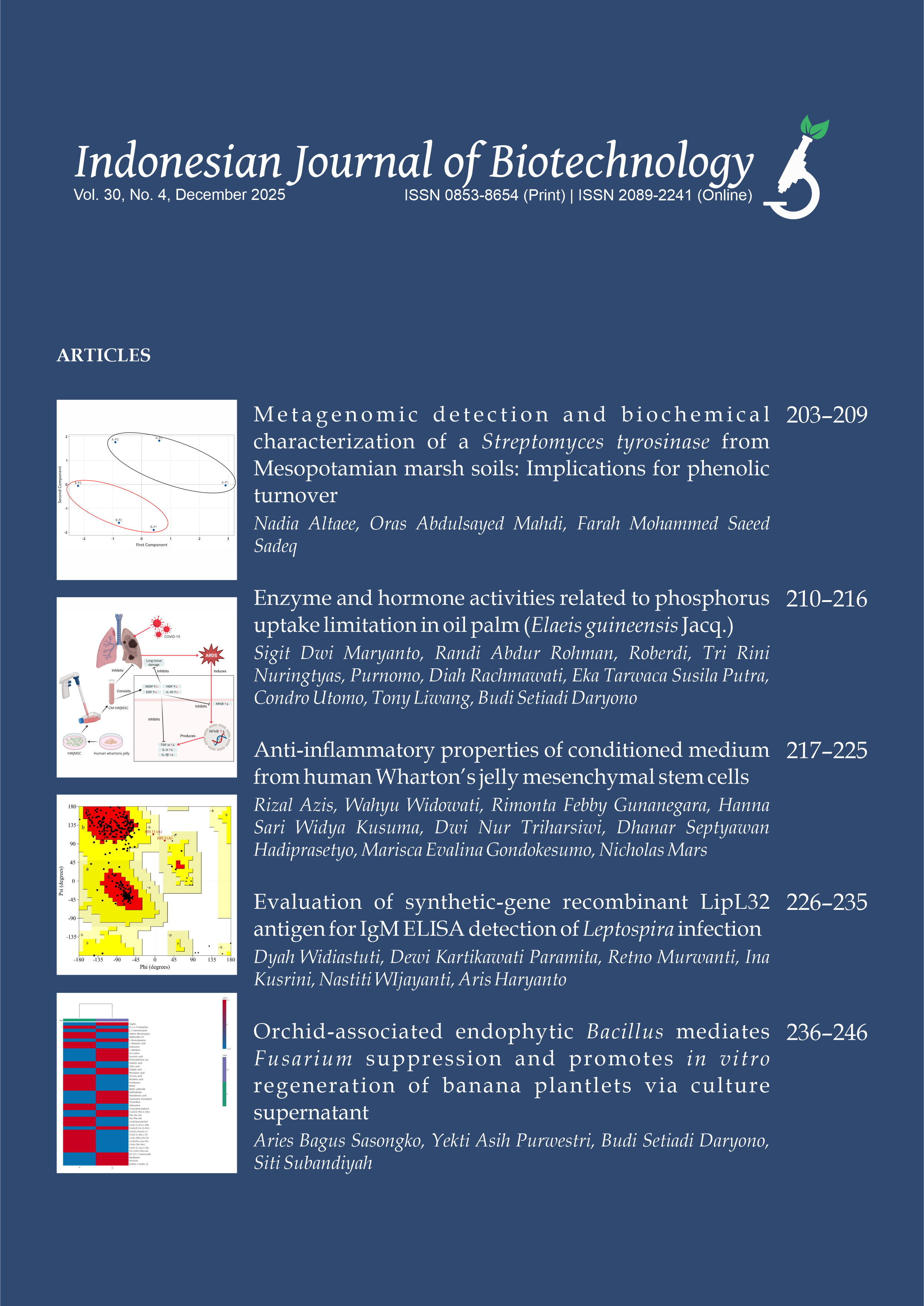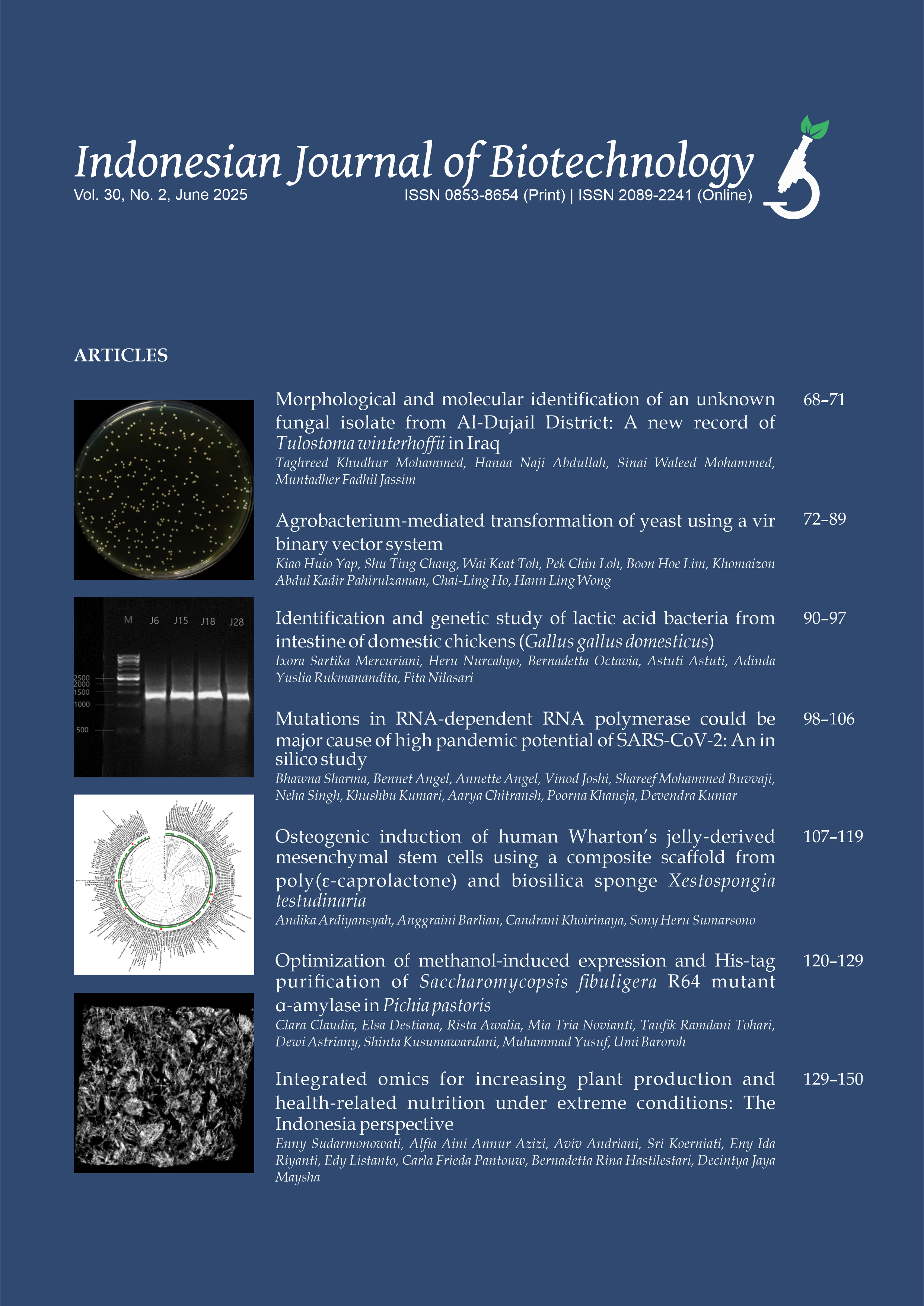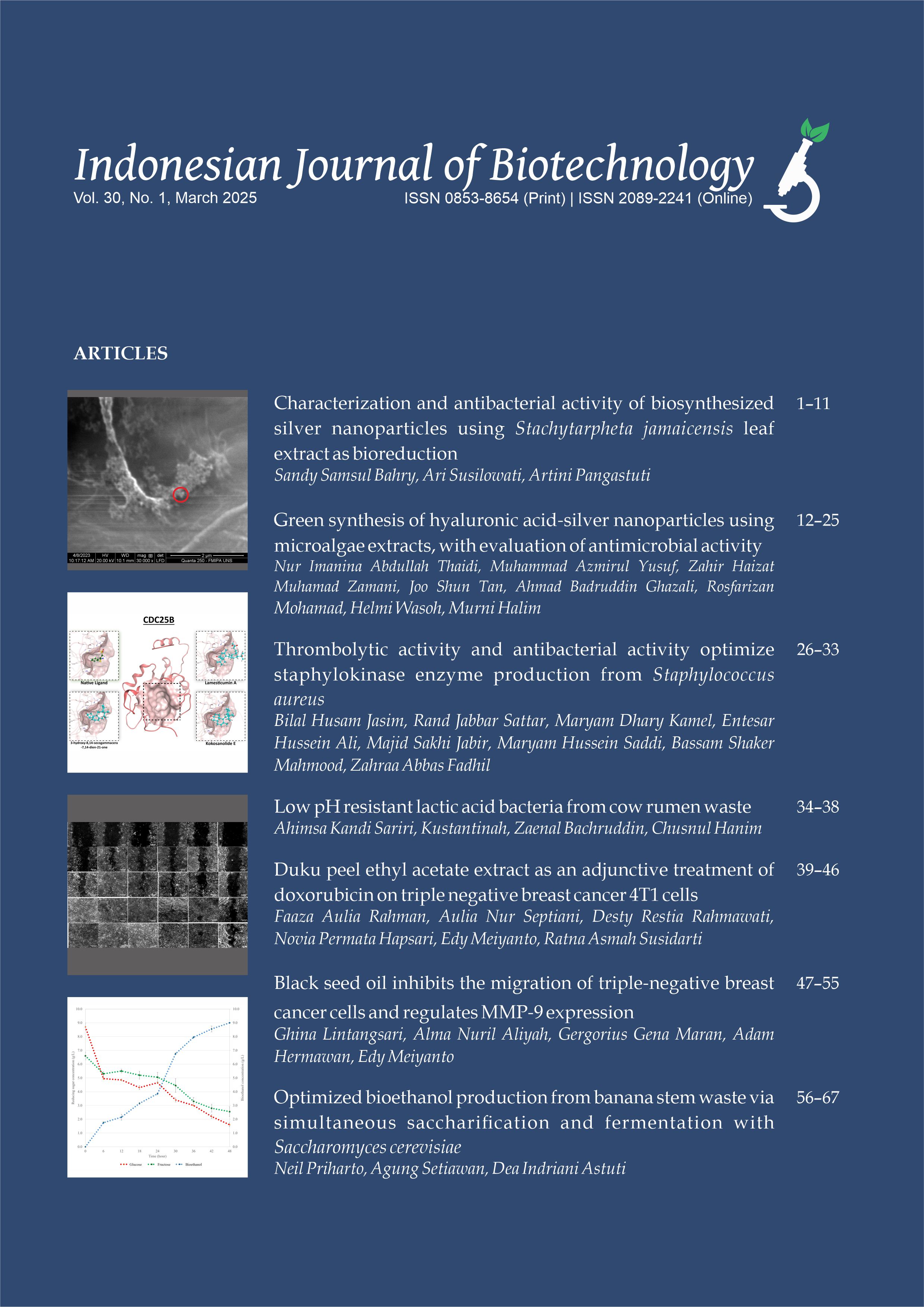Determination of allelopathic potential in mahogany (Swietenia macrophylla King) leaf litter using sandwich method
Arnia Sari Mukaromah(1*), Yekti Asih Purwestri(2), Yoshiharu Fujii(3)
(1) Faculty of Biology, Universitas Gadjah Mada, Jalan Teknika Selatan, Sekip Utara, Yogyakarta 55281
(2) Faculty of Biology, Universitas Gadjah Mada, Jalan Teknika Selatan, Sekip Utara, Yogyakarta 55281
(3) Departement of International Environmental and Agricultural Science, Tokyo University of Agriculture and Technology, Tokyo 183-0057
(*) Corresponding Author
Abstract
Keywords
Full Text:
PDFReferences
Appiah, K.S., Li, Z., Zeng, R., Luo, S., Oikawa, Y., and Fujii, Y. 2015. Determination of allelopathic potentials in plant species in Sino - Japanese floristic region by sandwich method and dish pack method. IJBAS., 4, 381–394.
Blum, U. (2011) Plant - plant allelopathic intraction. New York: Springer Science+Bussiness Media B.V.
Duke, S.O. 2015. Proving allelopathy in crop-weed interactions. Weed Sci., Special issue, 121-132.
Einhelling, F.A. (1995) Allelopathy: current status and future goals. In Allelopathy: organisms, processes, and applications (Inderjit, K.M.M. Dakshini, and F.A. Einhelling, eds.) pp 1-24. American Chemical Society.
El Zalabani, S.M., El-Askary, H.I., Mousa, O.M., Issa, M.Y., Zaitoun, A.A., and Abdel-Sattar, E. 2012. Acaricidal activity of Swietenia mahogani and Swietenia macrophylla ethanolic extracts against Varroa destructor in honeybee colonies. Exp. Parasitol., 130, 166–170.
Fan, K-C., His, H-C., Chen, C-W., Lee, H-L, and Hseu, Z-Y. 2011. Cadmium accumulation and tolerance of mahogany (Swietenia macrophylla) seedlings for phytoextraction applications. J. Environ. Manage, 92, 2818-2822.
Farooq, M., Jabran, K., Cheema, Z.A., Wahid, A., and Siddique, K.H. 2011. The role of allelopathy in agricultural pest management. Pest Manag. Sci., 67, 493–506.
Fujii, Y., Parvez, S.S., Parvez, M.M., Ohmae, Y., and Uda, O. 2003. Screening of 239 medicinal plant species for allelopathic activity using the sandwich method. Weed Biol. Manag., 3, 233–241.
Fujii, Y., Shibuya, T., Nakatani, K., Itani, T., Hiradate, S., and Parvez, M.M. 2004. Assessment method for allelopathic effect from leaf litter leachates. Weed Biol. Manag., 4, 19–23.
Fujii, Y., Pariasca, D., Shibuya, T., Yasuda, T., Kahn, B., and Waller, G.R. (2007) Plant-box method: a specific bioassay to evaluate allelopathy through root exudates. In Allelopathy new concepts and methodology (Y. Fujii and S. Hiradate, eds.) p 43. Science Publishers.
Gniazdowska, A and Bogatek, R. 2005. Allelopathic interactions between plants: Multi site action of allelochemicals. Acta Physiol. Plant., 27, 395–407.
Jabran, K., Mahajan, G., Sardana, V., and Chauhan, B.S. 2015. Allelopathy for weed control in agricultural systems. Crop Prot., 72, 57–65.
Krisnawati, H., Kallio, M., and Kanninen, M. (2011) Swietenia macrophylla King: Ecology, silviculture and productivity. Bogor: CIFOR.
Mardani, H., Kazantseva, E., Onipchenko, V., Fujii, Y. 2016. Evaluation of allelopathic activity of 178 Caucasian plant species. Int. J. Basic Appl. Sci., 5, 75–81.
Moghadamtousi, S.Z., Goh, B.H., Chan, C.K., Shabab, T., and Kadir, H.A. 2013. Biological activities and phytochemicals of Swietenia macrophylla King. Molecules, 18, 10465–10483.
Morikawa, C.I.O., Miyaura, R., de Lourdes Tapia y Figueroa, M., Rengifo Salgado, E.L., and Fujii, Y. 2012. Screening of 170 Peruvian plant species for allelopathic activity by using the Sandwich Method. Weed Biol. Manag., 12, 1–11.
Muhartini, S. (1987) Allelopathy mahoni (Swietenia mahogany Jacq.) Terhadap Perkecambahan dan Pertumbuhan Tanaman Disekitarnya. Research manuscript. Yogyakarta: Faculty of Agriculture UGM.
NIEAS. (2006) Screening of plant species with high allelopathic activity. http://www.niaes.affrc.go.jp/sinfo/result/result30/result30_44.pdf. Accessed on November 8th, 2016
Nugroho, S.A. (2014) Litterfall production and semi aerobic decomposition of leaf mahogany (Swietenia macrophylla King.). Thesis manuscript. Bogor: Sekolah Pascasarjana IPB. http://repository.ipb.ac.id/handle/123456789/69250. Accessed on November, 2nd, 2016.
Paritala, V., Chiruvella, K.K., Thammineni, C., Ghanta, R.G., and Mohammed, A.,2015. Phytochemicals and antimicrobial potentials of mahogany family. Brazilian J. Pharmacogn., 25, 61–83.
Rice, E.L. (1984) Allelopathy. Florida: Academic Press Inc.
Roy, A. and Saraf, S. 2006. Limonoids: overview of significant bioactive triterpenes distributed in plants kingdom. Biol. Pharm. Bull., 29, 191–201.
Singh, H.P., Batish, D.R., and Kohli, R.K. 2003. Allelopathic interactions and allelochemicals: new possibilities for sustainable weed management. CRC. Crit. Rev. Plant Sci., 22, 239–311.
Soares, M.G., Batista-Pereira, L.G., Fernandes, J.B., Corrêa, A.G., Da Silva, M.F.G.F., Vieira, P.C., Rodrigues Filho, E., and Ohashi, O.S. 2003. Electrophysiological responses of female and male Hypsipyla grandella (zeller) to Swietenia macrophylla essential oils. J. Chem. Ecol., 29, 2143–2151.
Takemura, T., Sakuno, E., Kamo, T., Hiradate, S., Fujii, Y. 2013. Screening of the growth-inhibitory effects of 168 plant species against lettuce seedlings. Am. J. Plant Sci. 4, 1095–1104.
Tambaru, E. (1998) Pengaruh Hasil dekomposisi seresah mahoni (Swietenia macrophylla King) terhadap perkecambahan biiji, innfeksi mikoriza vesikular-arbuskular dan pertumbuhan bibit akasia (Acacia mangium Wild.). Thesis. Yogyakarta: Faculty of Biology UGM.
Weir, T.L., Park, S.W., Vivanco, J.M. 2004. Biochemical and physiological mechanisms mediated by allelochemicals. Curr. Opin. Plant Biol., 7, 472–479.
Whitmore, T.C. (2003) Mahogany: tree of the future. In Big-Leaf Mahogany Genetics, Ecology, and Management (A.E. Lugo, J.C.F. Colón and M. Alayón, eds.) pp. 1-5. Springer-Verlag.
Article Metrics
Refbacks
- There are currently no refbacks.
Copyright (c) 2016 The Author(s)

This work is licensed under a Creative Commons Attribution-ShareAlike 4.0 International License.









